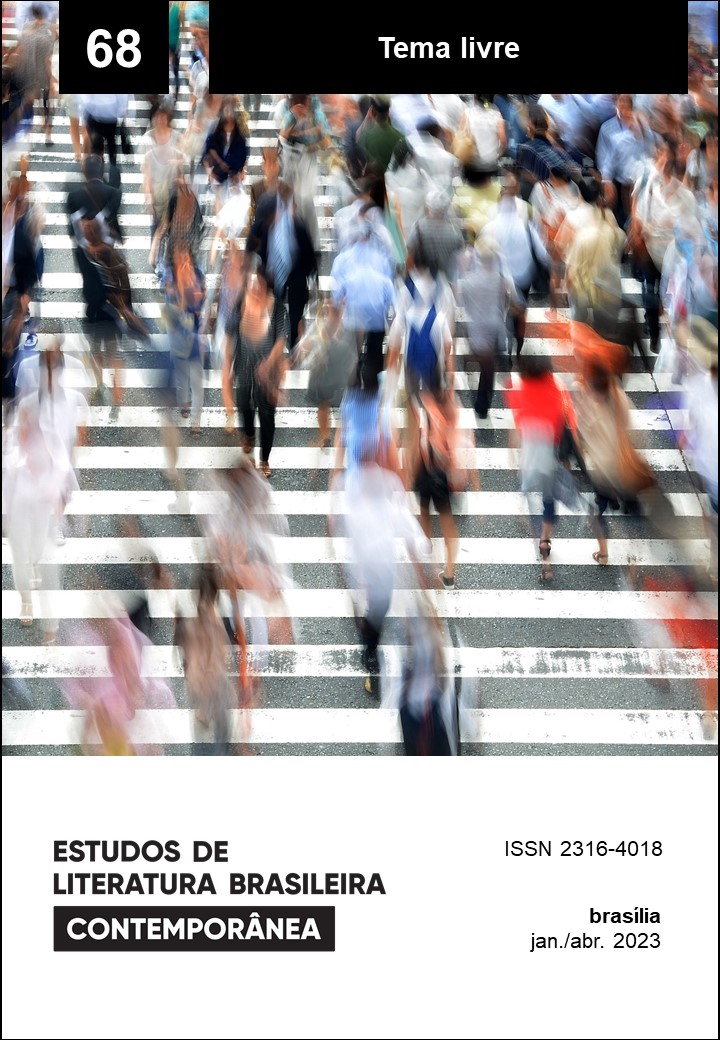Mass culture and parody in Tupinilândia
Keywords:
Brazilian contemporary literature; mass culture; parody; TupinilândiaAbstract
The novel Tupinilândia, by Samir Machado de Machado, published in 2018, uses mass culture to talk about itself, and how it sustains the collective memory as well as the aspirations of a society in a capitalist context. This article showed how Machado, by building a parodic narrative, as defined by Hutcheon (1988), with elements of mass culture, without falling back into adherence and uncritical homage or rejection, manages to establish a game that allows a reflection on the country’s history, of contemporary issues such as capitalism and memory, points raised in depth in a parodic novel of entertainment literature. For that, historical characters and events mentioned by the author were selected, as well as cultural references to that period of History, in order to understand the factual repertoire on which Tupinilândia is based. Passages that echo classic adventure stories and mobilize the general knowledge of this type of narrative were also highlighted. It was observed that Tupinilândia both reflects trends in contemporary Brazilian literature pointed out by Schollhammer (2009), in how much it creates a particular space with his sophisticated reflection both about the current Brazilian reality, questioning the role of dystopia as mere sarcasm in the face of of the absurdities that surround us, and about the way in which our society deals with memory and nostalgia, a selective fantasy in which relevant elements are disregarded, and those that are harmful are always at risk to return.
Downloads
References
ADORNO, Theodor W. (2009). Indústria cultural e sociedade 5ª ed. São Paulo: Paz e Terra.
BENJAMIN, Walter (2022). A obra de arte na era de sua reprodutibilidade técnica. In: BENJAMIN, Walter. Obras escolhidas I: magia e técnica, arte e política. 8. ed. São Paulo: Brasiliense. p. 179-212.
BOYM, Svetlana (2002). The future of nostalgia Nova York: Basic Books.
ECO, Umberto (2001). Apocalípticos e integrados São Paulo: Perspectiva.
GASPARI, Elio (2016). A ditadura acabada Rio de Janeiro: Intrínseca.
HUTCHEON, Linda (1988). A poética do pós-modernismo Tradução de Ricardo Cruz. Rio de Janeiro: Imago.
MACDONALD, George F.; ALSFORD, Stephen (1995). Museums and theme parks: Worlds in collision? Museum Management and Curatorship, v. 14, n. 2, p. 129-147. https://doi.org/10.1016/0260-4779(95)00050-3
» https://doi.org/10.1016/0260-4779(95)00050-3
MACHADO, Samir M. (2018). Tupinilândia São Paulo: Todavia.
MATHEW, Shaj (2015). Welcome to literature’s duchamp moment: avant-garde fiction is starting to resemble conceptual art. The new republic Disponível em: https://newrepublic.com/article/121603/avant-garde-literature-starting-resemble-conceptual-art Acesso em: 9 mar. 2021
» https://newrepublic.com/article/121603/avant-garde-literature-starting-resemble-conceptual-art
MENESES, Ulpiano T. B. (1994). Do teatro da memória ao laboratório da História: a exposição museológica e o conhecimento histórico. Anais do Museu Paulista: História e Cultura Material, São Paulo, v. 2, n. 1, p. 9-42. https://doi.org/10.1590/S0101-47141994000100002
» https://doi.org/10.1590/S0101-47141994000100002
RAJEWSKY, Irina O. (2005). Intermediality, intertextuality, and remediation: a literary perspective on intermediality. Intermedialités, Montréal, n. 6, p. 43-64.
SCHOLLHAMMER, Karl E. (2009). Ficção brasileira contemporânea Rio de Janeiro: Civilização Brasileira.
Downloads
Published
How to Cite
Issue
Section
License

This work is licensed under a Creative Commons Attribution-NoDerivatives 4.0 International License.
Authors who publish in this journal agree to the following terms:
a) The authors maintain the copyright and grant the journal the right of first publication, the work being simultaneously licensed under the Creative Commons Attribution License-Non Commercial 4.0 which allows the sharing of the work with acknowledgment of the authorship of the work and publication this journal.
b) Authors are authorized to enter into additional contracts separately, for non-exclusive distribution of the version of the work published in this journal (eg publish in institutional repository or as a book chapter), with authorship recognition and publication in this journal.
c) Authors are allowed and encouraged to publish and distribute their work online (eg in institutional repositories or on their personal page) after the editorial process, as this can generate productive changes, as well as increase the impact and citation of published work (See The Effect of Free Access).
d) The authors of the approved works authorize the magazine to, after publication, transfer its content for reproduction in content crawlers, virtual libraries and the like.
e) The authors assume that the texts submitted to the publication are of their original creation, being fully responsible for their content in the event of possible opposition by third parties.


